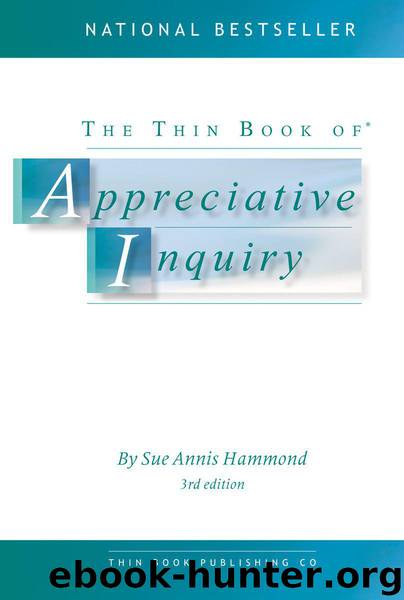The Thin Book of Appreciative Inquiry (3rd Edition) by Sue Annis Hammond

Author:Sue Annis Hammond
Language: eng
Format: mobi
Publisher: Thin Book Publishing
Published: 2013-11-23T18:30:00+00:00
Describe an incident when you or someone you know went the extra mile to provide the customer what they really wanted when they wanted it.
What made that possible?
What was your specific contribution?
Describe the contributions of others.
What was the work environment like during that time?
Describe a time when you were proud to be a member of the team/group.
What specifically made you proud?
What do you value most about being a member of this team/group?
Why?
Discover
Identify the best of 'what is'
Once you have the questions, it's time for the group to discover what is best about the topic. This truly is the opportunity to look at the organization with an appreciative eye. Ideally, you would invite participants to pair up and ask each other the questions. If possible, encourage people to pair up with someone they don't know well or work closely with in order to maximize the opportunity to reinforce the human universal, the need to be seen as essential to the group . If the 'system' is a small group, you could have a group inquiry in which the group stays together and each member takes a turn answering the questions. Other options that are less inclusive (and less effective) but sometimes used, are to use a team of employees to interview the entire organization or include the questions in a climate survey or focus groups.
The responsibility of the interviewer is to capture the answers in enough detail that he or she can report key points to the larger group. You are looking for three levels of information: (1) what the interviewee actually experienced and how their own performance made a difference, (2) how other people contributed to the experience and (3) the systemic factors or policies that made success possible. Specifically identifying the three levels will contribute a lot of valuable information for the Design phase.
Other interviewer responsibilities are to record the 'quotable quotes' of the person. Those are particularly helpful because they can inspire others or summarize examples of peak performance in 'poetic' language. If your interviewee cannot think of an example that occurred within his/her own group or the organization, ask him to recall an example of any group he was a part of. While the emphasis is on finding moments of success within the group, any experience the interviewee had with success within the topic will help them envision doing it again, this time within the organization.
Negative Information
If you have an interviewee who only responds with negative information, ask them the 'miracle question.' Here's an example: 'If a miracle occurred and you showed up to work tomorrow with all the problems gone, what would the team working at its best look like {or whatever the inquiry is about}?' 32 Unfortunately, a small number of people stuck in the negative frame are present at most AI forums. My advice is to do your best to practice the three human universal needs with them. Let them speak and be heard and don't force them to report a 'reality' that they just don't have.
Download
This site does not store any files on its server. We only index and link to content provided by other sites. Please contact the content providers to delete copyright contents if any and email us, we'll remove relevant links or contents immediately.
The Hot Zone by Richard Preston(2006)
Rigor Mortis by Richard Harris(1708)
How Innovation Works by Matt Ridley(1632)
Oxymoronica by Dr. Mardy Grothe(1557)
Mawson's Will by Lennard Bickel(1453)
Kathryn Bowers & Barbara Natterson-Horowitz by Zoobiquity(1408)
THE DEMON HAUNTED WORLD by Carl Sagan(1340)
The Future of the Mind: The Scientific Quest to Understand, Enhance, and Empower the Mind by Michio Kaku(1332)
Bankrupting Physics by Alexander Unzicker(1314)
The End of Breast Cancer by Kathleen T. Ruddy MD(1294)
Statistics Done Wrong: The Woefully Complete Guide by Alex Reinhart(1293)
The Ghost Hunters by Deborah Blum(1278)
One Two Three ... Infinity: Facts and Speculations of Science by George Gamow(1232)
Science Book by Big Ideas Simply Explained(1227)
The Universe Speaks in Numbers by Graham Farmelo(1217)
The Wizards of Langley by Jeffrey T Richelson(1132)
Biomimicry by Janine M. Benyus(1104)
Rigor Mortis: How Sloppy Science Creates Worthless Cures, Crushes Hope, and Wastes Billions by Richard Harris(1074)
The Case Against Fragrance by Kate Grenville(1047)
